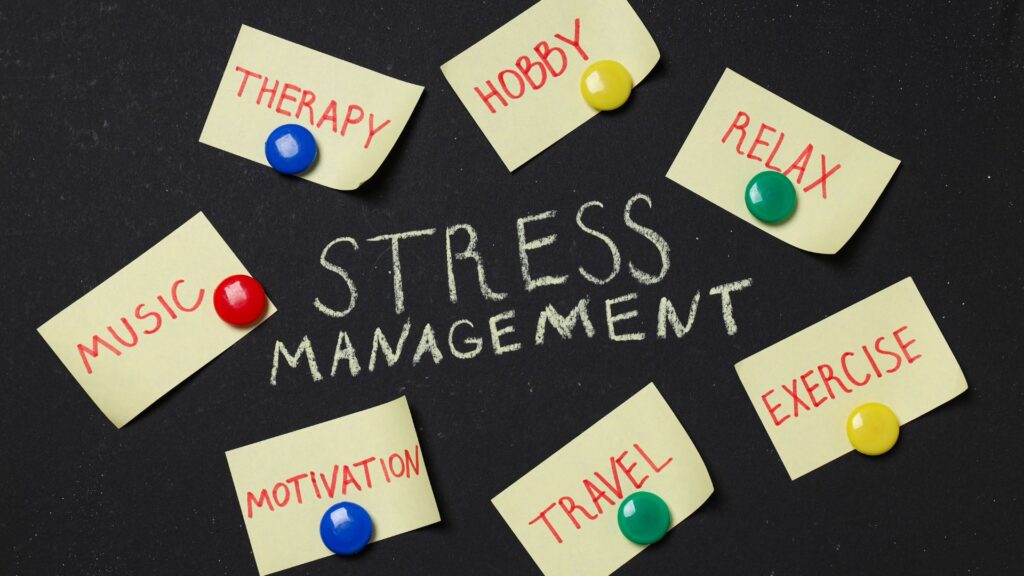Introduction:
Stress is an inevitable part of life, but managing it effectively is the key to maintaining overall wellbeing. One powerful tool to combat stress is mindfulness. In this blog, we’ll explore how mindfulness can help you take control of your stress and guide you toward a more peaceful, balanced life. So, let’s dive in!
What is Mindfulness?
At its core, mindfulness is about paying attention to the present moment without judgment. It’s the practice of being aware of your thoughts, emotions, and sensations as they happen, helping you stay grounded and fully engaged in life.
Why Mindfulness is Key to Stress Management?
Mindfulness enables us to hit pause and reassess our thoughts and reactions, reducing the tendency to get overwhelmed by stress. By bringing awareness to the present moment, you can break free from the automatic stress-response patterns that often dictate how we feel.

The Science Behind Mindfulness
Science backs up the effectiveness of mindfulness for stress relief. Studies have shown that mindfulness can lower cortisol, the stress hormone, and activate the parasympathetic nervous system, which is responsible for the body’s rest and relaxation response.
How Mindfulness Reduces Stress: Scientific Explanation
When practicing mindfulness, you engage the prefrontal cortex, the part of your brain responsible for executive function and emotional regulation. This reduces activity in the amygdala, the brain’s stress and fear center, making you less reactive to stressful situations.
Mindfulness and Cortisol Levels: A Closer Look
Elevated cortisol levels are linked to chronic stress, anxiety, and a variety of health issues. Mindfulness has been shown to significantly lower cortisol, helping you feel calmer and less stressed on a physiological level.

Benefits of Practicing Mindfulness for Stress Relief
Practicing mindfulness comes with a multitude of benefits that can profoundly impact your mental and physical health.
Improved Emotional Regulation
Mindfulness teaches you to observe your emotions without becoming consumed by them, giving you the space to respond thoughtfully rather than react impulsively.
https://youtu.be/1dbYduxIpwE?si=koWRCPrsDZ3Mn5kx
Enhanced Focus and Clarity
Mindfulness enhances your ability to focus on the task at hand. It eliminates mental clutter, helping you make better decisions and improve problem-solving skills.
Reducing Anxiety and Depression Symptoms
Mindfulness has been found to reduce the symptoms of anxiety and depression. By focusing on the present moment, you stop ruminating over the past or worrying about the future.
Mindfulness Techniques for Stress Management
There are several mindfulness techniques you can incorporate into your daily routine to manage stress more effectively:
Mindful Breathing
Focusing on your breath is one of the simplest and most effective mindfulness techniques. Just close your eyes, take slow deep breaths, and pay attention to the sensation of breathing in and out.
Body Scan Meditation
A body scan involves mentally scanning your body from head to toe, observing any tension or discomfort, and releasing it through mindful awareness.
Guided Visualization
Guided visualization helps you manage stress by picturing yourself in a calm, serene place. Imagine a peaceful beach or a lush forest, allowing the stress to melt away.
https://blissfultrend.com/fall-wellness-routines-2024-seasonal-change/
Mindful Eating
Eating mindfully involves fully engaging your senses—taste, smell, texture—while eating. It helps prevent overeating and encourages a healthy relationship with food.
Incorporating Mindfulness into Daily Life
The great thing about mindfulness is that you don’t need to dedicate hours to practice. Small, mindful moments sprinkled throughout your day can make a big difference.
Start Small: Micro-Mindfulness Moments
Begin by integrating micro-mindfulness practices into your day. For example, take a few seconds to focus on your breath while waiting for your morning coffee or practice mindful walking during your lunch break.
Mindfulness in the Workplace: Reducing Work Stress
Workplace stress is a common issue, but mindfulness can help. Taking short mindfulness breaks, even for a few minutes, can increase productivity and reduce work-related anxiety.
Mindfulness and Relationships: Fostering Emotional Connection
Mindfulness strengthens relationships by encouraging present, compassionate communication. Instead of reacting impulsively, you respond with empathy and understanding, which reduces conflicts.
Mindfulness vs. Meditation: What’s the Difference?
While mindfulness is often associated with meditation, they are not the same. Meditation is a dedicated practice of focusing your mind, whereas mindfulness can be practiced anytime, anywhere.
How to Get Started with Mindfulness for Stress Management
Ready to start your mindfulness journey? Here’s how:
Setting an Intention
Before you begin, set an intention for your practice. This could be as simple as “I want to reduce my stress levels” or “I want to be more present.”
Creating a Mindfulness Routine
Establish a regular routine by setting aside time each day to practice mindfulness. Start with five minutes and gradually increase the duration as you become more comfortable.

Mindfulness Apps and Resources
Here are some top mindfulness apps and resources to help you on your journey:
Top Mindfulness Apps to Try
- Headspace
- Calm
- Insight Timer
- Ten Percent Happier
Recommended Books on Mindfulness and Stress
- The Miracle of Mindfulness by Thich Nhat Hanh
- Wherever You Go, There You Are by Jon Kabat-Zinn
Common Challenges When Starting Mindfulness Practice
Many people face challenges when starting a mindfulness practice, but these are normal and can be overcome.
Dealing with Restlessness and Boredom
Feeling restless or bored is common when starting mindfulness. Just acknowledge the feelings and gently bring your focus back to the present.
How to Stay Consistent with Mindfulness Practice
Consistency is key to reaping the benefits of mindfulness. Create reminders or pair mindfulness with daily activities, like brushing your teeth or eating breakfast, to make it a habit.
Mindfulness for Different Age Groups
Mindfulness is beneficial for all ages, but the approach might differ depending on the individual.
Mindfulness for Kids and Teens
Teaching mindfulness to children can improve focus, emotional regulation, and stress management. Mindfulness exercises for kids can be playful and engaging, such as focusing on their breathing while blowing bubbles.
Mindfulness for Seniors
For seniors, mindfulness can be a powerful tool to manage stress, enhance memory, and promote relaxation in their golden years.

Mindfulness and Physical Health
The benefits of mindfulness extend beyond mental health and can also positively impact physical wellbeing.
How Mindfulness Helps in Managing Chronic Pain
Mindfulness can alter how the brain perceives pain, making chronic pain more manageable by reducing the emotional response tied to it.
Connection Between Mindfulness and Better Sleep
Mindfulness has been shown to improve sleep quality by helping individuals calm their minds and relax their bodies before bed.
Myths About Mindfulness and Stress Management
“Mindfulness is Time-Consuming”
Many believe that mindfulness requires a lot of time, but in reality, you can practice it in just a few minutes a day.
“Mindfulness is Only for Relaxation”
While mindfulness does promote relaxation, its primary function is to bring awareness to the present moment, which helps you better handle life’s challenges.
Mindfulness and Mental Health
Mindfulness can play a significant role in maintaining and improving mental health by reducing anxiety, depression, and even PTSD symptoms.
Cognitive Behavioral Therapy (CBT) and Mindfulness
Many therapists now combine mindfulness with Cognitive Behavioral Therapy (CBT) to help individuals change negative thought patterns and reduce stress.
Building a Mindfulness Community
Building a supportive mindfulness community can enhance your practice.
The Importance of a Supportive Environment
Having a support system helps keep you accountable and motivated in your mindfulness journey.
Mindfulness Groups and Retreats
Joining mindfulness groups or attending retreats can deepen your practice by immersing you in a supportive, like-minded community.
Conclusion: Embrace Mindfulness for a Stress-Free Life
Mindfulness is a powerful tool that helps you manage stress, improve emotional regulation, and maintain a balanced life. By incorporating mindfulness into your daily routine, you can reduce stress and live a more fulfilling, peaceful life.


